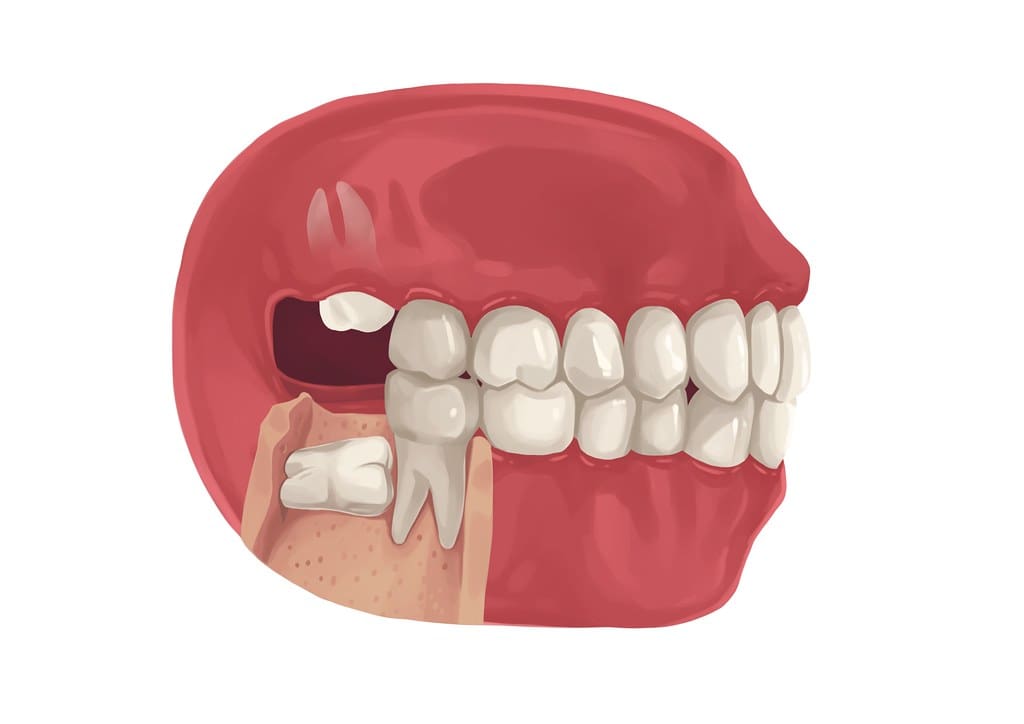The third set of molars located in the rear ends of your upper and lower jaw are known as wisdom teeth. They usually come out between the ages of 18 and 24.
In many instances, wisdom teeth experience difficulty emerging successfully into your mouth. They may get stuck, either in your jawbone or in your gum. When a third molar tooth becomes trapped, it is called an impacted wisdom tooth.
As an impacted wisdom tooth tries to push through your gum and erupt, it might exert force on and damage the second molar in the process. It may also become infected. When this happens, you can experience symptoms that can be quite debilitating, such as pain and swelling around the area, difficulty opening the mouth, and pain in the jaw.
Other symptoms may include:
- Swelling around your jaw or face.
- Red, swollen, or bleeding gums.
- A bad taste in your mouth.
- Bad breath (halitosis).
- Pus exuding from the gums.
- Fever.
When wisdom teeth erupt in alignment with the rest of the teeth, they still spell trouble for many people. Sometimes, the problem is one of space. This can be even more problematic for you if you’ve had braces. Third molars can crowd the neighbouring teeth, jeopardising the careful alignment achieved through years of orthodontic treatment. In smaller mouths, it is difficult to clean them properly with toothbrush and floss as they are situated so far back in the mouth. Hygiene deficits inevitably lead to decay and infection and can potentially harm the other teeth.
So, why is there a space issue for these teeth? Considering the evolutionary changes that human skull shape and jaw size have undergone over the last few million years, it is remarkable that wisdom teeth still exist. Modern humans produce exactly the same number of teeth as their prehistoric forebears (32) did. However, over time, while craniums grew to accommodate larger brains, jaw size significantly shrank. Anthropologists believe that the large and powerful jaws characteristic of early humans decreased in size as weapons took the place of teeth in hunting and self-defense, and refined, cooked food substituted for the readily available and simple diet that consisted mainly of gristly meat and rough grain.
Can an Impacted Tooth Cause Problems if Left Unaddressed?
Third molar teeth have garnered quite a reputation among dentists for being useless and troublesome. Similar to how physicians handled tonsils 50 years ago, they are indiscriminately yanked as a preventive measure to maintain dental health.
However, research now suggests that wisdom teeth should only be pulled out if they cause problems or are likely to in the future. Only your dentist can determine if you need an extraction based on your clinical and radiographic findings.
More often than not, impacted wisdom teeth cause many serious oral health problems if left untreated. Here are some of the potential complications a wisdom tooth might cause:
- Infection
Impacted wisdom teeth, particularly those that have only erupted halfway through the gums (partially erupted), create an opening in the gum that can harbour bacteria. This can lead to food particles and plaque accumulating around the partially erupted tooth, ultimately resulting in a painful infection of the gums (or pericoronitis in the dentist linguo). This infection can cause swelling, tenderness, and difficulty chewing or opening the mouth. - Damage to neighbouring teeth
Impacted wisdom teeth can press against the second molars, the teeth adjacent to the third molars, and exert pressure on them. This not only raises the risk of infection in that area but can also erode the enamel of the neighboring tooth. Damage to the enamel, the outermost protective layer, can lead to cavities and a compromised tooth structure of the second molar teeth. Sometimes, this pressure is enough to cause the neighboring teeth to shift or become misaligned. - Cysts
Wisdom teeth grow in sacs within the jawbone. There is a risk for these sacs to fill with fluid and form cysts. These cysts can damage the jawbone, teeth, and nerves and, in rare instances, may give rise to a tumour. Although this type of tumour is usually noncancerous (benign), its removal may necessitate removing the surrounding tissue and bone. - Tooth decay
Positioned in a manner that allows food to get stuck between them and the gum, partially impacted wisdom teeth are most prone to developing cavities. Their position makes them harder to clean and, thus, renders them more susceptible to decay. - Sinus Problems
If it is an upper impacted wisdom tooth, it can sometimes exert pressure on the sinuses, small air-filled cavities present in the facial bones around the nose, causing sinus pain and congestion. The roots of the upper wisdom teeth can be located close to the sinus floor. If they become infected, this may lead to sinus-related symptoms that can be very uncomfortable.
In conclusion, leaving impacted wisdom teeth unaddressed can lead to a myriad of complications that affect not only your oral health but also your well-being. Early detection and timely treatment of impacted teeth can keep issues at bay. This further underscores the importance of routine dental visits. If you suspect you are having wisdom tooth problems, do talk to your dentist about it so they can investigate further and provide you with appropriate treatment.
When to Seek Dental Care
We recommend you visit your dentist if you have any of the symptoms mentioned in the area behind your last molar, as they may be related to an impacted wisdom tooth. At Bespoke Dental and Implant Clinic, we are committed to helping you achieve good oral health so you can focus on what matters to you. To learn more about wisdom tooth extraction, please click here.
